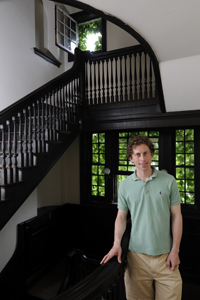Young mathematician earns AIM fellowship
By Steve Koppesskoppes@uchicago.edu
 Travis Schedler | |
Travis Schedler can work a problem in noncommutative geometry, play a Bach toccata on the organ, finish a triathlon with a strong 10K and then recount the details in fluent French.
Schedler now launches his academic career as the 2008 recipient of a five-year fellowship from the American Institute of Mathematics. AIM presents the fellowship annually to a new Ph.D. who has the potential to leave a lasting mark on mathematics.
“Travis Schedler is an exceptionally strong, young mathematician,” said Victor Ginzburg, Professor in Mathematics and the College. “People of his caliber appear one or two in a decade. He is certainly the strongest among graduate students in algebra and representation theory I have seen during my 14 years in Chicago.”
Before he completed his Ph.D. in mathematics in June, Schedler co-authored three papers with Ginzburg. “Victor Ginzburg is an excellent adviser,” Schedler said. “He has lots of ideas he shares with his students. It’s very stimulating to work with him.”
Noncommutative geometry is a special interest of Schedler’s. “If you wanted to call it by some more official name, it would be algebra or pure algebra,” he said.
The order of values in a commutative mathematical problem can be changed without affecting its result. Changing the order of values in noncommutative problems does affect the result.
“Noncommutative geometry is trying to study algebras that don’t have the commutative property, still using the similar geometric approach that’s used when they’re commutative,” Schedler said. Unlike commutative geometry, “There’s no systematic approach to the field yet,” he said.
Schedler began training intensively in mathematics as a fifth-grade student in Carbondale, Ill., where Southern Illinois University mathematics professor Marvin Zeman tutored him for several years. Schedler then enrolled in advanced mathematics courses at the Illinois Mathematics and Science Academy in Aurora.
He graduated summa cum laude with a bachelor’s degree in mathematics from Harvard University in 2002. A Westinghouse Science Talent Search scholarship and a Barry Goldwater fellowship provided support for his studies at Harvard University.
Following his Harvard graduation, Schedler spent a year in Paris, where he honed his francophone skills. In Paris, he studied mathematics as a visiting foreign student at l’Ecole Normale Supérieure and organ interpretation at the fifth district Conservatory.
The opportunity to practice his French in Paris made passing the Math Department’s foreign-language examination a breeze. More recently, Schedler gained further international travel experience in Belgium. He spent two weeks at the University of Antwerp working with one of his collaborators, Rafael Bocklandt, who returned the visit in May.
In the musical arena, Schedler began taking piano lessons at age 5. He has continued his musical training at the University, studying under University Organist Tom Weisflog and singing in the Rockefeller Chapel Choir. On Saturday, Aug. 2, Schedler played the piano at the wedding of his brother, Eric, a graduate student in mathematics at Indiana University.
As an endurance athlete, Schedler also managed to complete the 2005 Accenture Triathlon. He trained for the event with office mate Masoud Kamgarpour, who also received his Ph.D. in mathematics this summer. Schedler’s time for the 1,500-meter swim, 40-kilometer bike ride and 10-kilometer run: two hours, 48 minutes and 40 seconds.
“I would like to do another one, but I wasn’t sure I was going to be here in August this summer, so I didn’t register,” Schedler said. Nevertheless, he managed to fit some extended bicycle touring into his schedule. In May, he and his father, George, professor and chairman of the philosophy department at SIU, Carbondale, bicycled 200 miles of the Cape Breton’s Cabot Trail in Nova Scotia.
This fall, Schedler will become a C.L.E. Moore instructor in mathematics at the Massachusetts Institute of Technology. At MIT, he will draw upon the substantial teaching experience he gained at Chicago. As a College Fellow in his first year at Chicago, Schedler served as a teaching assistant for classes in Complex Analysis and Analysis. As a Mathematics Instructor, he later taught Calculus and Math Methods for the Social Sciences Division.
“I found teaching often to be more difficult than research because you have a whole group of students you have to watch out for, rather than just yourself,” Schedler said. “Math is not a person, and so it’s not going to go astray.”
![[Chronicle]](/images/sidebar_header_oct06.gif)